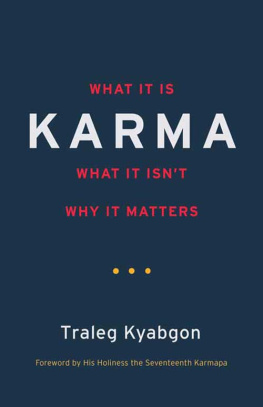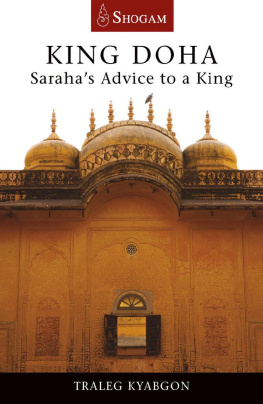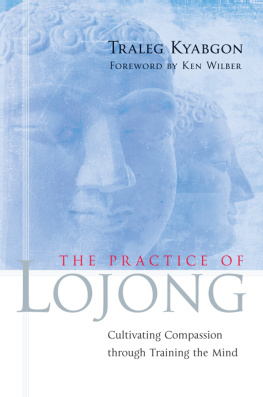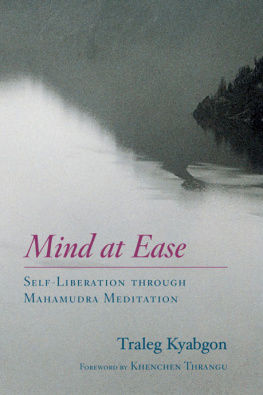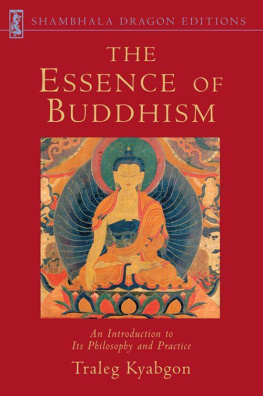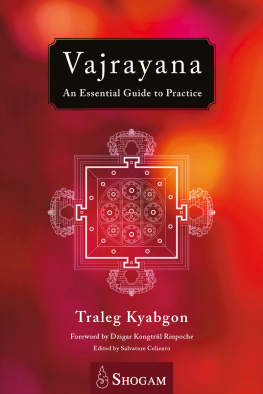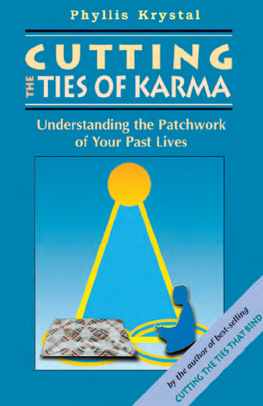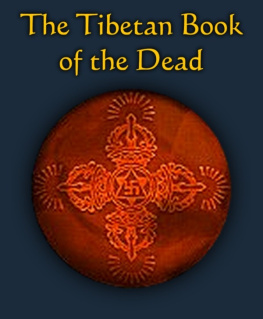Karma is often a misunderstood topic in Buddhism. This clear explanation from such an eminent teacher as the late Traleg Kyabgon Rinpoche, who possessed great knowledge of both dharma and the Western mind-set, will bring profound benefit to us all.
Dzigar Kongtrl Rinpoche, author of Its Up to You
ABOUT THE BOOK
The Buddhas teaching on karma (literally, action) is nothing other than his compassionate explanation of the way things are: our thoughts and actions determine our future, and therefore we ourselves are largely responsible for the way our lives unfold. Yet this supremely useful teaching is often ignored due to the misconceptions about it that abound in popular culture, especially oversimplifications that make it seem like something not to be taken seriously. Karma is not simple, as Traleg Kyabgon shows, and its to be taken very seriously indeed. He cuts through the persistent illusions we cling to about karma to show what it really isthe mechanics of why we suffer and how we can make the suffering end. He explains how a realistic understanding of karma is indispensable to Buddhist practice, how it provides a foundation for a moral life, and how understanding it can have a transformative effect on the way we relate to our thoughts and feelings and to those around us.
TRALEG KYABGON (19552012) was born in Eastern Tibet and educated by many great masters of all four major lineages of Tibetan Buddhism. He is the founder of the Kagyu E-Vam Buddhist Institute, which is headquartered in Melbourne, Australia, with a major practice center in upstate New York and a practice community in New York City. He taught extensively at universities and Buddhist centers in the U.S., Canada, Australia, New Zealand, and Southeast Asia beginning in 1980, and is the author of numerous books that present Buddhist teachings to Western readers, including The Essence of Buddhism and Mind at Ease .
Sign up to receive weekly Tibetan Dharma teachings and special offers from Shambhala Publications.

Or visit us online to sign up at shambhala.com/edharmaquotes.
KARMA
WHAT IT IS, WHAT IT ISNT, WHY IT MATTERS
Traleg Kyabgon

SHAMBHALA
Boston & London
2015
Shambhala Publications, Inc.
Horticultural Hall
300 Massachusetts Avenue
Boston, Massachusetts 02115
www.shambhala.com
2015 by Traleg Kyabgon
All rights reserved. No part of this book may be reproduced in any form or by any means, electronic or mechanical, including photocopying, recording, or by any information storage and retrieval system, without permission in writing from the publisher.
Library of Congress Cataloging-in-Publication Data
Kyabgon, Traleg, 1955
Karma: what it is, what it isnt, why it matters / Traleg Kyabgon.
pages cm.
eISBN 978-0-8348-0090-8
ISBN 978-1-59030-888-2 (paperback)
1. Karma. I. Title.
Bl2015.K3K93 2015
202.2dc23
2014042484
CONTENTS

THE KARMAPA
Of the many Tibetan Dharma teachers who have settled in the West, Traleg Kyabgon Rinpoche was one of the few who possessed an extensive training in traditional Buddhist philosophy combined with knowledge of Western philosophy and psychology and the study of comparative religion. During his many years working with Westerners, he developed a deep understanding of Western culture. Able to communicate in fluent English, he was well aware of the misappropriation of Buddhist terms in popular culture and was always concerned to maintain the essence and purity of Buddhism through his Dharma teachings.
In this, Rinpoches last book, his thorough examination of karma and related topics, such as emptiness, the nature of the self, death, and rebirth, will be of great benefit as an authoritative countermeasure to common misunderstandings of Buddhist teachings. He clearly explains how the process of karma is not mechanistic but dynamic; it operates within a complex web that interconnects and affects all things within the universe, both animate and inanimate. I believe that fully understanding this is of particular importance in the twenty-first century, when the actions of individuals, groups, and nations have far-ranging impacts on the lives and well-being of other sentient beings. Indeed, our planet itself now faces possible destruction at the hands of human beings. It is very important that we understand the intricate, multifaceted relationship between cause and effect. What we do as individuals in daily life will affect not just us but other people, the world at large, and even the universe.
At the individual level, this book provides helpful advice and practical suggestions for Buddhist practitioners, emphasizing how a correct understanding of karma can open up opportunities for transformation and help us make our lives meaningful.
It is my hope that this final flourishing of Rinpoches scholarship and Dharma teaching will be of benefit to all his students, to Buddhists of all traditions, and to those who wish to explore what Buddhism teaches.

Ogyen Trinley Dorje, the Seventeenth Karmapa
Gyuto Monastery, Dharamsala, India
August 4, 2014
HUMAN BEINGS FROM THE EARLIEST TIMES have wondered about where they came from and where they may be headed. This desire to know, not only about our past but also about our future, weighs very heavily on us. As a result, we have come up with various explanations in terms of how we came to be what we are and about where we are going. There are many theistic explanations that provide answers to this quandary, and there are secular explanations that address the question in terms of biology and so on. After reviewing these different perspectives on our life history, religion generally is not satisfied with simply looking at life as we live it, because in many ways religion always asks us to question, and so we remain unsatisfied with the kinds of answers given by science. The problem of suffering, for one thing, remains. Therefore, in Buddhism, we believe that the concepts of karma and rebirth offer a kind of view that may explain all manner of suffering for humans and other living beings. Buddhism addresses the issue of suffering to a degree not seen in any other religion. In Christianity, it is said Lord Jesus died for us, that he sacrificed himself to relieve us of our suffering; but to believe in that notion one has to have absolute faith. Buddhism, on the other hand, does not demand such a belief.
Buddha did not proclaim that he would take the suffering of others upon himself. He pointed the way to the truth of suffering and its pervasiveness. Even so, he did not suggest that all in life was suffering, but rather he outlined, along with certain unavoidable realities, the manner in which we invite so much suffering upon ourselves. In this sense he was unique. The Buddha presented suffering in a way that gave individuals a role to play in terms of the level, intensity, and degree to which they experienced it. He also offered a way beyond suffering altogether. For this reason, the Buddha spoke about karma. Karmic theory is unbelievably profound, but unfortunately, due to the New Age philosophies prevalent these days, many intelligent people do not take it very seriously.
This is very unfortunate, because the Buddhas application of the notion of karma was as unique as his explanation of suffering. In India in pre-Buddhist times, karma was indeed interpreted as a theory of predestination, almost comparable to the Protestant notion of the same name. Both of these theories claim that we cannot change our karma, for instance. What is often lost in peoples understanding of karma though, especially within Buddhism, is what the Buddha actually introduced himself. He did not just talk about karmic causes but also about karmic conditions. Buddha does not teach that there are linear causal relationships, where a single cause can bring about a single effect. Buddha teaches that there are many causes and many conditions and always refers to causes and conditions in the plural, never just as cause and effect. We are presented with a very complex picture of how things work. Just because a certain thing seems to have caused something to happen does not mean the particular cause we identified was solely responsible. The effect may not have come into existence at all had it not been for the facilitating conditions supporting its fruition.
Next page
